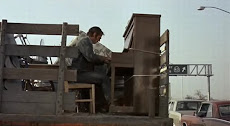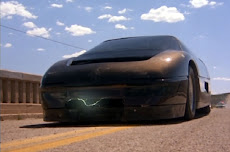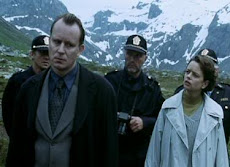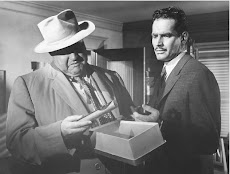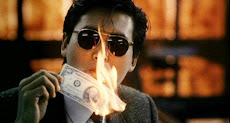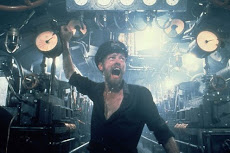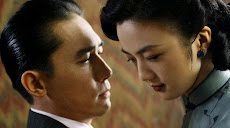[I]t was like we was both back in older times and I was on horseback goin' through the mountains of a night. Goin' through this pass in the mountains. It was cold and there was snow on the ground and he rode past me and kept on goin'. Never said nothin' goin' by. He just rode on past... and he had his blanket wrapped around him and his head down and when he rode past I seen he was carryin' fire in a horn the way people used to do and I could see the horn from the light inside of it. 'Bout the color of the moon. And in the dream I knew that he was goin' on ahead and he was fixin' to make a fire somewhere out there in all that dark and all that cold, and I knew that whenever I got there he would be there. And then I woke up.
The ideal father, strong and resolute, would not have avoided Chigurh. On the other hand, perhaps with that stark last line Bell believes this dream is just that: maybe no one would really have the grit to take on the pure evil of Chigurh.
Cormac McCarthy went on to write The Road, a popular novel with a recent, decent film adaptation of its own, that redeemed the bitter ending of No Country. In Road’s post-apocalyptic future, a father and son travel through the worst of mankind, and the father carries the proverbial fire with all of the resolve that Bell could only dream of. The Coens were not involved in the film adaptation of The Road, but they may have provided their own addendum to No Country for Old Men with their latest film, the remake (or re-envisioning) of Charles Portis’s novel True Grit. The film delivers up a hero with the selflessness that we longed for in No Country and received in the The Road.
 Jeff Bridges plays Rooster Cogburn, an aged Arkansas lawman whose reputation leads young Mattie Ross (Hailee Steinfeld) to offer him a reward to track down Tom Chaney (Josh Brolin), the man who murdered Mattie’s father. LaBoeuf (Matt Damon) is a Texas Ranger who is already pursuing Chaney for a different murder, and he teams up with Cogburn, though their relationship is tenuous at best. Already an impressively confident 14-year-old girl, Mattie’s resolve to join the two men on the hunt is proven when she fords a river with her horse in order to catch up with him. But despite her young grit, the violence—often outright barbarism— that pervades the Indian lands where Chaney has fled is still new to her; she has a long way to go to attaining true grit.
Jeff Bridges plays Rooster Cogburn, an aged Arkansas lawman whose reputation leads young Mattie Ross (Hailee Steinfeld) to offer him a reward to track down Tom Chaney (Josh Brolin), the man who murdered Mattie’s father. LaBoeuf (Matt Damon) is a Texas Ranger who is already pursuing Chaney for a different murder, and he teams up with Cogburn, though their relationship is tenuous at best. Already an impressively confident 14-year-old girl, Mattie’s resolve to join the two men on the hunt is proven when she fords a river with her horse in order to catch up with him. But despite her young grit, the violence—often outright barbarism— that pervades the Indian lands where Chaney has fled is still new to her; she has a long way to go to attaining true grit.
There are a number of things to admire in this True Grit. There is not one bad performance. The Coens give us yet another very amusing court room scene, as they did in Intolerable Cruelty, where Cogburn’s no-nonsense answers to a recent arrest gone wrong introduce his character and humorously play off of the doctrine that prohibits attorneys from asking leading questions. As in some of their best films, the Coens also are unafraid to use the language of the period, and play great jokes off of old manners and customs. The cinematography wants for nothing. But ultimately, as with any film, it’s the story, and in this case the heroism, that elevates True Grit to greatness.
Rooster Cogburn is far from perfect. A drunk, and an arrogant one, his heroism at the climax of the film (with details I will spare) is unexpected. After much macho, adolescent sparring with LaBoeuf and almost giving up the hunt for Chaney, we’re left with the impression that Cogburn’s best days may be behind him. But when the time comes, his selflessness is as unquestionable as it is visceral. Whether facing bandits or snakes, he is methodical and does not hesitate to act when he must. Cogburn is not as old as No Country’s Sherriff Bell, but he is well past his prime. Although he’s not Mattie’s father, he risks his life for her as we could only hope the best fathers would. The man lives up to his legend after all.
The Coens’ True Grit may redeem the despair of their No Country film as effectively as The Road novel did the No Country novel. Indeed, Cogburn could be that man in Sheriff Bell’s dream more easily than the father in The Road. But some uneasiness remains, at least for this critic: where are today’s heroes? Why can’t we have them now? No Country is a nearly modern setting, the 1980s, whereas True Grit is set in the early 1900s and The Road in a (hopefully) never-determined future. Many of the most popular films today cast off any realistic portrayals of heroes into the future or back into antiquity. Is our only hope that a radioactive spider might bite the good-hearted newspaper photographer?
To be sure, going back to The Odyssey, legends have a place in instilling virtue. But must the vast majority of today’s cinematic heroism be seldom relatable to reality? And even when the term “hero” is brought up, must we moviegoers really endure the title of being placed on the likes of Valerie Plame? Indeed, there are indicators of a desire to see more modern fare: the heroism shown in last year’s Hurt Locker might explain why it won the Best Picture Academy Award despite so few having heard of the film before it won.
True Grit is an excellent film and yet further proof that the Coens are among America’s most gifted filmmakers, and my only complaint is that hopefully the next hero they deliver up is someone we could actually know.


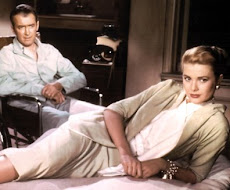_01.jpg)



